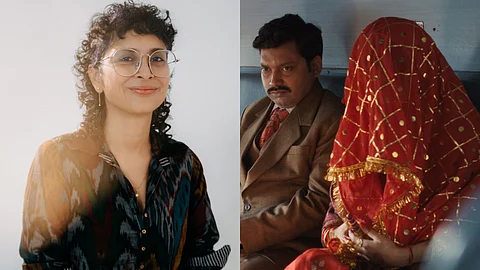

Kiran Rao is yet to be bored of talking about Aamir Khan. The couple announced their divorce in 2021, after 15 years of marriage. However, leading up to the release of her feminist satire Laapataa Ladies, headlines couldn’t get enough of their annulment. “The main question was how do we work together after divorce?” says Kiran with a laugh, as we sit for a post-release chat in a Bandra flat, which serves as an office space for Aamir Khan Productions, the production house behind Laapataa. “It’s just interesting to see why it’s new for people to understand that you can be divorced and still be family to each other,” she says. But I wonder if it sometimes distracts the narrative from the film. “Oh, it does. But then all PR is good PR I guess?”
It’s not just PR that has worked for the film which marks Kiran’s return to the director’s chair over a decade after her debut Dhobi Ghat (2010). Recently, parallel-cinema icon Shabana Azmi took to Instagram to laud Laapataa. Calling it a “delightful” film, Azmi praised the performances and pointed out the authenticity of the film’s atmosphere. “The audience was laughing and clapping,” she wrote. Laapataa brings back a forgotten world of rural India, which has been absent for quite some time in Hindi cinema. “Villages aren’t shown in the theatres maybe because filmmakers think escapist cinema is what audiences really want to see,” says Kiran. “It isn’t that box office friendly to make a film situated in the hinterlands. But our villages and our small towns are so rich in stories. There are so many tales from just the everyday experience of living in this country.”
A hilarious goof-up is at the centre of Laapataa Ladies. Two newly-wed brides get swapped because the blinding ghoonghat (veil) over their stooping heads renders them indistinguishable. Although the film is shot in Madhya Pradesh and parts of Maharashtra, the events are described as happening in the fictional state of ‘Nirmal Pradesh’. “We didn’t want to reduce the idea of the film to a cultural phenomenon of just one place. We wanted to globalize the idea,” explains Kiran. “Whenever you situate a film anywhere or it is about any community, there are always bound to be some audiences who might take offence on things like ‘Why is this language spoken here? We don’t speak like this, or these things don’t happen where we live’. It just made sense to make my own state with my own rules.”
An amusing detail lies in the names of the two young women around whom the drama unfolds in Laapataa. While the demure Phool (Nitanshi Goel) gets left behind at the railway station, her husband Deepak (Sparsh Shrivastava) mistakenly takes home the assured Pushpa Rani (Pratibha Ranta). Flowers seem to be a recurring motif in the film (Deepak’s village is also named after one). “In Biplab Goswami’s screenplay (Two Brides on which the film is based), the central character’s name was Phool. It was Sneha’s (the film’s screenwriter) decision to name the other girl Pushpa,” says Kiran. “It was just a smart device to show how each woman is different but they undergo similar experiences.”
Both brides, Phool and Pushpa, struggle to walk with red veils obstructing their sight. They aren’t allowed to take their husbands’ names and are expected to walk behind them, in their shadows. Kiran’s treatment, however, doesn’t necessarily villainize Phool’s husband Deepak. In some ways, he is also a victim of a patriarchal setup. “Deepak is not a macho guy. He isn’t very bright. He just wants to do the right thing and he genuinely loves his wife,” says Kiran. “He was our way of saying that there can be a strong male character without him being muscular or wielding a gun. He is such a hero in my eyes and a lovely example for men everywhere. Sparsh also played him with such gentleness.”
Another flip on the rural cop cliche was Ravi Kishan’s Manohar. He is a pan-chewing, music-loving policeman who is more amused than intrigued by this bridal mix-up. “Ravi played the character with such ras,” says Kiran. Even Aamir auditioned for the part and although he did well, he wasn’t taken. Kiran had earlier stated that having a superstar like him would disbalance people’s expectations of the film. “If he is on the screen, you are waiting for him to surprise you,” says Kiran. “Till date, people tell me that I shouldn’t have taken Aamir for Dhobi Ghat, since everybody else felt so real. It takes something for the audience that knows him and loves him to just see him as a character. For them, he is always Aamir Khan.”